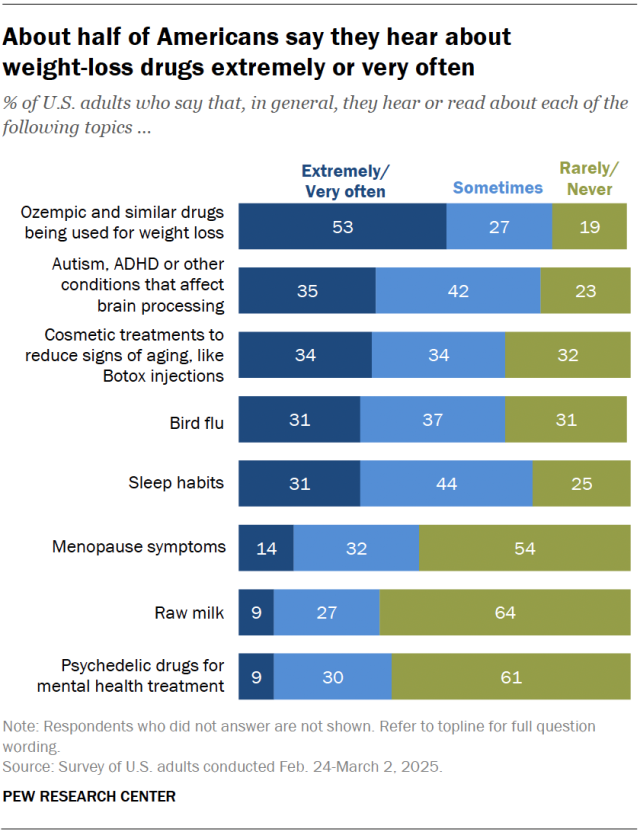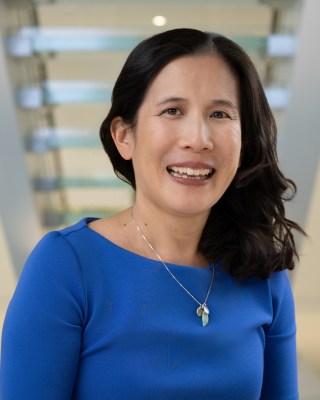Emerging and trending health topics generate a lot of buzz. But there is considerable variation in how much Americans hear about certain health topics that are in the news these days, according to a new Pew Research Center survey.
About half of U.S. adults (53%) say they hear or read about Ozempic, Wegovy and similar drugs being used for weight loss extremely or very often, whether it’s in the news, on social media or in conversations with others.
Roughly a third of adults report hearing about other current health topics with the same frequency:

- 35% say they hear or read about autism, ADHD or other conditions that affect how the brain processes information extremely or very often.
- 34% say this about cosmetic treatments that can reduce signs of aging, such as Botox injections.
- 31% say this about bird flu.
- 31% say this about sleep habits.
Far fewer adults say they regularly hear about two other topics asked about in the survey: 9% hear about raw, unpasteurized milk extremely or very often, while an identical share say this about psychedelic drugs like LSD or psilocybin mushrooms being used for mental health treatment.
Related: How Americans view weight-loss drugs and their potential impact on obesity in the U.S.
Differences by gender

Of the eight health topics the survey asked about, women are more likely than men to say they regularly hear about five of them.
The gender gap is largest on cosmetic treatments that can reduce signs of aging, like Botox. About four-in-ten women (42%) say they hear about these treatments extremely or very often, compared with 25% of men.
There’s also a significant gender gap on Ozempic, Wegovy and similar drugs being used for weight loss (59% vs. 47%).
Related: As obesity rates rise in the U.S. and worldwide, new weight-loss drugs surge in popularity
Women are also more likely than men to say they hear extremely or very often about autism, ADHD or other conditions that affect brain processing (41% vs. 29%) and about menopause symptoms (19% vs. 8%).
When it comes to bird flu, similar shares of women and men report hearing a lot about the topic (31% vs. 32%). And few in both groups say they hear regularly about raw milk and psychedelic drugs being used for mental health treatment.
Age patterns among women
Among women, there are some notable age patterns on certain health-related topics.

Younger women are increasingly turning to anti-aging procedures like Botox injections, even as most recipients are middle-aged women. Young women are about as likely as older women to say they hear regularly about cosmetic treatments like Botox: 45% of women ages 18 to 29 say this, as do 47% of women ages 65 and older.
By contrast, more older than younger women say they hear a lot about Ozempic and similar drugs being used for weight loss (63% of women ages 65 and older vs. 52% of those ages 18 to 29).
Menopause symptoms

At a time when doctors and celebrities have called for improved education and awareness about how menopause symptoms affect women’s lives, exposure to the topic is modest.
- Among women in their 40s and 50s – that is, around the 45-to-55 age range when women typically go through menopause – 32% say they hear about menopause symptoms extremely or very often. Fewer women in other age groups say the same.
- Still, 27% of women ages 40 to 59 say they rarely or never hear about menopause symptoms.
Among men in all age groups, about six-in-ten or more say they rarely or never hear about menopause symptoms.
Note: Here are the questions used for this analysis, the topline and the survey methodology.

